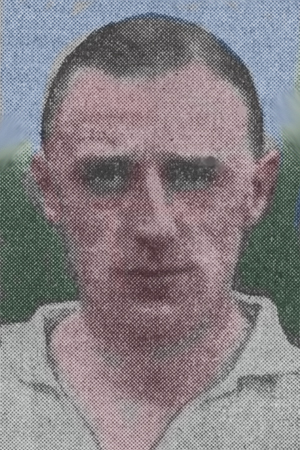| Clifford Tarr | |
| Appointed Manager: | April 1932 |
| Departed: | May 1936 |
| First game in charge: | 27th August 1932 v Nantwich home D 1-1 |
| Last game in charge: | 28h April 1936 v Winsford United home W 2-1 |
| Games in charge: | Played 195 Won 79 Drawn 28 Lost 88 |
| Honours with Mossley | Manchester FA Shield Runners up: 1936/37 |
Clubs as Player: |
Mossley West Lads |
| Previous Clubs as Manager | none |
| Later Clubs as Manager | none |
Clifford Tarr joined Mossley as an amateur in 1922 making 5 appearances in the 1921-22 season but was understudy first to Ernie Moores and then Jackie Darley and he returned to play for Mossley West Lads, returning to Mossley to play in their newly formed reserve team in 1923. It wasn't until Darley's retirement that Tarr got an extended run in the team and he made 40 appearances in the 1926-27 season scoring 11 goals. A direct and tricky winger who's favourite trick was to knock the ball past his marker and run around the other side of him, he was selected that season to represent the Northern Counties against the Southern Counties at Dulwich scoring the only goal. He was then honoured to play for the Amateurs against the Professionals ( a regular fixture in those days) at Manchester City where he again excelled. He was a first team regular and oft goalscorer for the Lilywhites right up until the 1933-34 season when he retired from playing. He was selected to represent the Cheshire League on several occasions, one such being against the Welsh National League at Caernarfon in 1929. Tarr was appointed Secretary and Player-Manager in April 1932, continuing playing until 1934 and then remaining as Secretary-Manager until 1936. A popular figure throughout his long association with Mossley AFC. Tarr played a total of 275 games for Mossley scoring 47 goals. His son Dennis had a spell as a player at Mossley in the 1952-53 season and Clifford's brother Gilbert was Mossley Club President in the late 1960's and inaugurated the Club's Player of the Year award in 1971. Clifford Tarr's appointment as team manager came following Alt Jackson's defection to Ashton National and he became the first person to be solely in charge of team selection. Previously the team was selected by committee. In his second season in charge Mossley beat Glossop to win the Manchester Junior Cup and the following season won the Ashton Challenge Cup in a twice replayed final against Droylsden. He also kept Mossley in mid-table in the Cheshire League despite having the lowest wage bill in the League. He resigned at the ned of the 1935-36 season.
|
|
